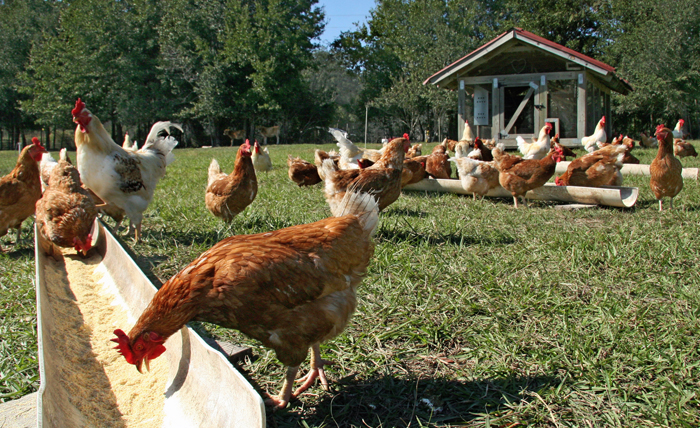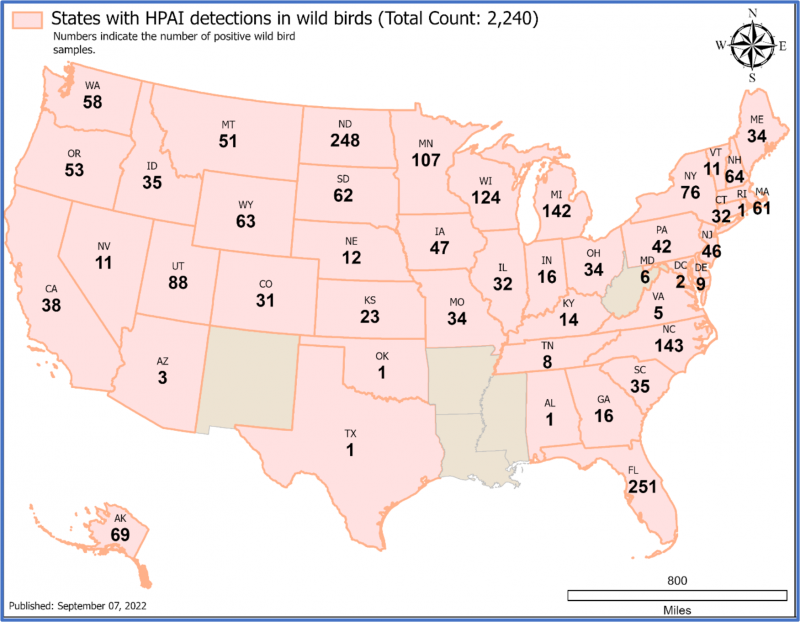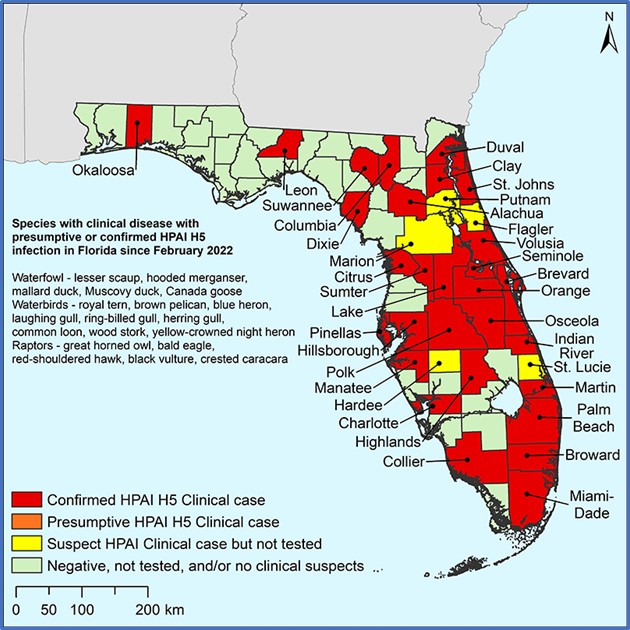
Highly Pathogenic Avian Influenza or Bird Flu has been confirmed in 26 Florida counties in the wild bird population over the first eight months of 2022. Monitor your flock closely and report any suspected outbreaks. Credit: Tom Wright, UF/IFAS
Samantha Wisely & Bridget Baker, UF/IFAS Department of Wildlife Ecology and Conservation
Bird flu or avian influenza is a virus that circulates among wild birds around the world. Often when the virus comes into contact with domestic birds, like chickens, ducks and turkeys, it causes mild or minimal symptoms. Some strains of avian influenza, however, can cause severe symptoms and death in wild and domestic birds; these strains are called highly pathogenic avian influenza (HPAI). Globally, HPAI has caused huge losses to commercial poultry farms and has threatened backyard flocks, native wildlife, and human health. In January 2022, a Eurasian strain of HPAI, named H5N1, was detected in wild birds in the Eastern US. Since then, the virus spread rapidly across the US, and HPAI has been found in wild birds in nearly every state (Figure 1). While H5N1 is not considered particularly severe in people, one person who worked in a commercial poultry plant has died from avian influenza during this current outbreak.

Figure 1. Number of wild birds that have tested positive for highly pathogenic avian influenza from January – August 2022 across the United States. Data and figure from United States Department of Agriculture, Animal and Plant Health Inspection Services, Wildlife Service.
=
In Florida the large number of HPAI cases in wild birds have mostly occurred in Peninsular Florida, although the Panhandle has seen a handful of counties with cases as well (Figure 2). The number of cases in wild birds in the Panhandle and across Florida is expected to increase as the Fall 2022 wild bird migration gets underway.

Figure 2. Number of wild birds that have tested positive for highly pathogenic avian influenza from January – August 2022 in Florida. Data and figure from the Florida Fish and Wildlife Commission.
=
The current outbreak of the H5N1 avian influenza has hit the US commercial poultry industry particularly hard. From January to August 2022, more than 250 commercial flocks and 200 backyard flocks have had infected birds resulting in more than 44 million poultry dying from virus or being euthanized to prevent further spread. Affected poultry included chickens, ducks, turkey, pheasants, quail, geese and guinea fowl. In Florida, as of August 2022, one small flock in Seminole County was found to have infected birds. More inflected small farm and backyard flock infections are anticipated this fall.
–
Protect your poultry flock from bird flu by taking the following precautions:
- Practice good biosecurity. Keep wild birds away from your flock. This includes the feathers and feces of wild birds.
- Wash your hands with soap and water before and after coming into contact with poultry. If you don’t have immediate access to soap and water, use hand sanitizer.
- Clean and disinfect your poultry equipment before and after use.
- Monitor your flock’s health daily. Symptoms of bird flu include: respiratory, nervous system, gastrointestinal, and general symptoms, notably: nasal discharge, gasping for air, coughing, sneezing, tremors, paralysis, twisted neck, diarrhea, lack of energy, appetite, or coordination, purple discoloration, or swelling of body parts.
- Minimize the movement of poultry on and off your property. Isolate new birds from the rest of your flock for at least 30 days before allowing mixing of birds.
- Report sick birds. The USDA will test your sick birds for free. Call (866) 536-7593 to reach USDA veterinarians. To reach state veterinarians you can reach the Florida Departments of Agriculture and Consumer Services (FDACS) by calling (850) 410-0900 (during office hours) or (800) 342-5869 (after hours) or by emailing RAD@FDACS.gov. Finally, if you find dead wild birds, you can report them to FWC through their reporting portal online: Report Wild Bird Mortalities
If you suspect your flock is infected, it is important to report it to state or federal authorities to prevent the spread of the virus, to prevent further losses in the area, and to protect public health. USDA will send personnel to your farm to test sick birds and remove dead birds. Just to make you aware, however, if avian influenza is found in your flock, they will likely euthanize the entire the flock to prevent further spread of this devastating disease to other farms in the area. The federal government does provide indemnity payments to producers whose flocks must be depopulated during a disease response.
More information and details about how you can prevent your flock from getting sick are available through the USDA Defend the Flock Resource Center.
- How Landowners Can Help Gopher Tortoise Conservation in the Florida Panhandle - August 29, 2025
- Armadillo Biology, Management, and Disease in the Panhandle - February 21, 2025
- Crop Damage from Deer in the Panhandle - August 15, 2024
